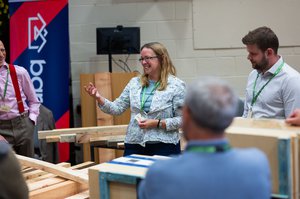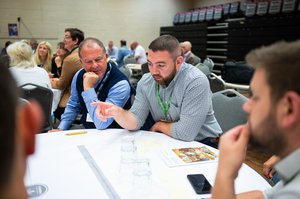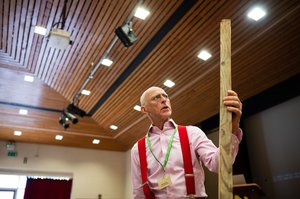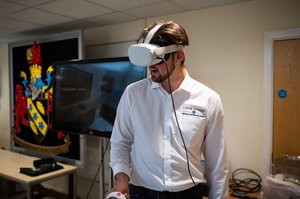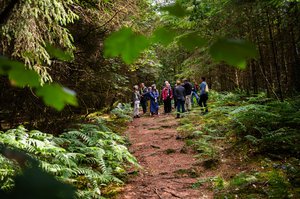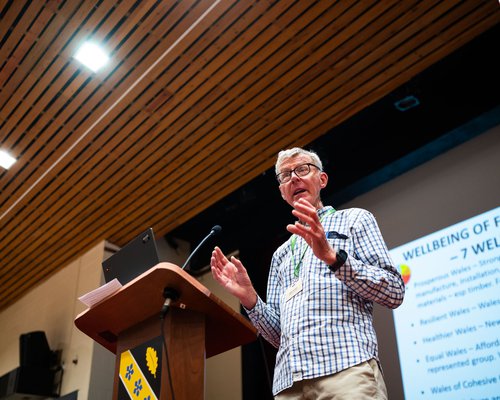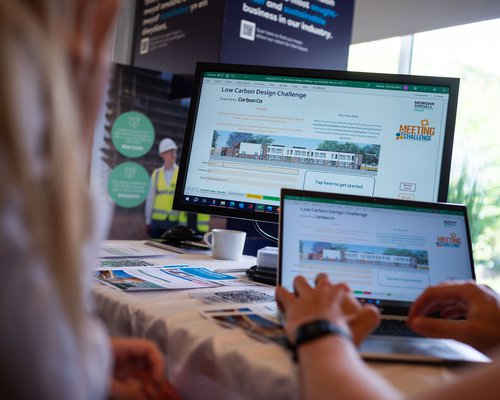A thriving forest-based economy is a key cornerstone in a sustainable society.
Yet, in the UK, the forest cover has declined by an estimated 8% since the early 1990’s, largely down to urbanisation and the changing landscape of farming.
In Wales alone, forest and woodlands cover only 12% of the land – significantly less than in the pre-neolithic age when trees covered 80% of the country.
Trees are essential for the country’s climate change objectives and the journey it now finds itself on is being championed by Woodknowledge Wales – an independent, for-public-good, Community Benefits Society.
Their vision is the transformation of Wales into a high-value forest nation through the purposeful development of Wales’s Forest industries, from tree to product, to benefit the economy, the environment, and the people of Wales.

So, what exactly is a high value forest nation?
Gary Newman, CEO of Woodknowledge Wales explains this in simple terms:
“The term Forest Nation is a way of telling a story of where Woodknowledge Wales and our members would like to see Wales moving towards. So it’s not just trees to make fence posts, but its also trees for advanced timber construction. It’s also trees for biodiversity and amenity. We know there is a massive single driver, which is climate change mitigation, and we know that plating trees draws carbon out of the atmosphere – despite this there is a cultural and education shift needed towards the timber industry and the part it can play in achieving a sustainable society.”
That’s not to say Wales isn’t forging ahead...
There are lots of exemplars in Wales using home-grown timber and Welsh Government is championing timber construction through a social landlords’ collective, led by Welsh Government Net Zero Carbon lead Steve Cranston:
“Working with a collaboration of 19 social landlords in Wales, we’re working on bringing forward the next generation of net zero homes. Within housing the penny has dropped that timber is the fabric solution for a whole range of reasons. If you’re overwhelmed with the problem, if you feel you have no agency, then you are in real trouble, but we have agency here and we’ve got to make every pound of investment count.”
Woodknowledge Wales can’t do this alone
Back in 2017 they only had two members, but slowly the membership, and their story, has begun to ripple through the industry:
Our strap line is innovation through collaboration and the solutions are out there. Making it happens comes down to people and whilst policies are good, fundamentally we need people and the big contracting companies like Morgan Sindall to pick up the mantle, make changes and keep the agenda alive because policy doesn’t build buildings, it doesn’t plant trees and it doesn’t make things out of timber” says Gary Newman of Woodknowledge Wales.
Morgan Sindall Construction became a member just this year and joined the wide range of members at Woodknowledge Wales international expo WoodBUILD.

Held in Lampeter, the conference hosted a mix of keynote speakers and practical workshops aimed at connecting the forest industries and built environment to open everyone’s eyes to the art of the possible.
Steve Cranston was one of those speakers:
There’s very few problems where part of the answer isn’t community. People coming together is really important because change happens at the speed of trust. It’s by making those connections that we will find the solutions and build those trusted relationships that we can move forward together with. It’s about unlocking that potential.”
Showcasing CarboniCa - our carbon calculator tool
Sandwiched in-between regenerative construction workshops with the supply chain and on-site forestry workshops, Morgan Sindall Construction invited members to run their own real life or theoretical projects through CarboniCa – our externally verified carbon calculation tool.
By inputting their project parameters, members were able to calculate the carbon impact of their projects, and then make adjustments to the modelling and note where carbon savings could be made.
David Humphrey, Framework Manager at Morgan Sindall Construction in Wales led members through the CarboniCa tool: “With sustainability targets being driven down year-on-year, it’s vital to consider carbon at the earliest possible stages of design. Using CarboniCa, our carbon calculator tool, our teams are able to guide clients and consultants, showing them the impact of their material and method choices from an embodied and whole life carbon perspective, way before a spade is put in the ground.”
As we move to a net zero carbon society, a better understanding and subsequent earlier decision-making process, must be underpinned by carbon led decisions – and with that, the option of using timber on projects, can be an option to help accelerate that journey.

Wales needs to be celebrating the fantastic natural resources available – making sure these nature-based solutions are considered as part of project design options with science-based evidence on how they really will make a difference.
As for becoming a high value forest nation, there is certainly a way to go, but based on the appetite, application and collaboration shown at WoodBUILD in Lampeter, it’s certainly a goal the country can achieve.

